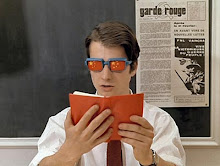
Jamaican born UK resident Kenneth Terroade recorded just this one album as a leader and was a part of only a handful of sessions under the direction of others, the majority belonging to free-drumming master Sunny Murray; three Actuel dates (we’ll get to them later) and a fourth, BIG CHIEF, originally released by the French Pathe label and recently reissued by the excellent Massachusetts label Eremite (I’ve previously covered BIG CHIEF elsewhere in the guts of this blog). Along with Actuel sessions by Alan Silva, Claude Delcloo and Dave Burrell, Terroade is also on a very enticing LP (kindly reinstated to availability by Downtown Music Gallery) by South African expat-drummer Selwyn Lissack, a date that just happens to feature another legendary lost guy of freedom, Ric Colbeck. Other than playing flute on Dr. John The Night Tripper’s SUN, MOON & HERBS from 1971 (and rumors of other rock sessions), that appears to be it for Terroade. I actually have that record by the Dr. on the shelf and recall that it’s a good time, though not as hot as his first few (Clapton’s on it, what’d ya’ expect?). I just might pull that one out for a spin, though I’ve been locked into LOVE REJOICE all damn day and it’s not even close to wearing out its welcome.
Terroade plays both flute and tenor sax, and while I almost always prefer sax to flute (I’m just that kinda guy) I’m thankful for his abilities as a flautist, partially due to his sound (it’s good, reaching for urgency over prettiness) but mainly because his dual horn status probably helped to increase the man’s meager number of discographical spots. It’s a stone drag that he didn’t have more opportunity to head sessions, because based on the evidence of his sole shot he was well suited for the role. Before LOVE REJOICE is even slapped upon the platter it’s clear that this will be a unique listen. The instrumental makeup is notable for the inclusion of two bass players and a bevy of multi-horn action, bass clarinet most notably. And the names involved really stand out. South African expat Ronnie Beer, a cohort of the late Chris McGregor, plays tenor, alto and flute. Evan Chandley, a member of Cohelmec Ensemble (who’s 1971 LP HIPPOTIGRIS ZEBRA ZEBRA is a superfine and ultra rare slab of zonked French jazz) plays bass clarinet and flute (we’re up to three flutes, if you’re counting. Yes, parts of this do sound a bit like a fife and drum corps showed up to jam after gobbling a sheet of prime blotter. That’s very nice, yes). Wily Frenchman Francois Tusques, leader of the hard to find though top heavy with names INTERCOMMUNAL MUSIC on Shandar (amongst other important recordings), plays keys. The quite prolific Bob (or Beb, or Bab, or Bernard) Guerin plays bass, as does Earl Freeman, a vet of numerous very heavy Archie Sheep groups of the same period and two vital Noah Howard ‘70s dates PATTERNS/MESSAGE TO SOUTH AFRICA (combined and reissued by Eremite, BTW). Claude Delcloo, a reliable part of the Actuel story, rounds out the group playing drums.
The result of getting all these guys into one room is two side long improvisations, both excellent and distinct. “Blessing” wastes no time getting right down to business. By the one minute mark the horns have taken off and Delcloo is fervently attacking his kit, Tusques passionately accenting while the basses rumble from the bottom. From there the intensity and density ebbs and flows, with players dropping out momentarily, and there are hints of late-Coltrane and early Impulse!-era Sanders, something vaguely remindful of Ayler circa LOVE CRY (a certain ache in the melody) and a more prominent line of influence to Don Cherry’s embrace of trad global folk. The rhythmical triangle really succeeds in keeping the proceedings at a constant simmer, and with one or both of the bassists using a bow through the majority of the piece the sonic range is expanded even further. At a few points, bowed string combines with lung heave to produce an air of bluesy lament. Delcloo’s aggressive tactic never falters by overstepping or breaking down the communicative flow, and Tusques’ steady keyboard clatter provides both necessary momentum and additional coloration. What a fine nineteen minutes.
The same can be said for side two, though there are some key differences, foremost being the pace of the music. “Love Rejoice” begins as a slow gnaw that builds and releases tension throughout, allowing for periods of sustained and harried horn junk and some quite attractive engagement between the two bassists and Delcloo. Long passages develop dirge like qualities, and the feeling of New Orleans is palpable in the Paris night. There’s a sound, I think it’s coming from the bass, that’s like someone’s precocious kid bouncing around the studio with an electric pogo-stick. Boing! Flutes arrive and flutter about. Slowly there is a shift, a rising of the intensity, the music attaining a maelstrom-like force. Everyone’s in with both feet, going for broke. They hit the sweet spot and then expertly rein it back, winding it down. Amazing. And while it’s a bit of a craw-sticker to see LOVE REJOICE and players as strong as Terroade and his band treated so shabbily by history, any ill feelings are easily remedied by simply playing the music again. That’s why they recorded it, you know? And after its beauties have unspooled into the air the sheer number of ears that hear it matters far less than those instances where the evolution of improvisational dialogue (what Oliver Nelson called the “abstract truth”) grabs a listener’s attention and won’t let go. Kenneth Terroade, welcome to my personal canon.
photo of Kenneth Terroade by Valerie Wilmer


No comments:
Post a Comment